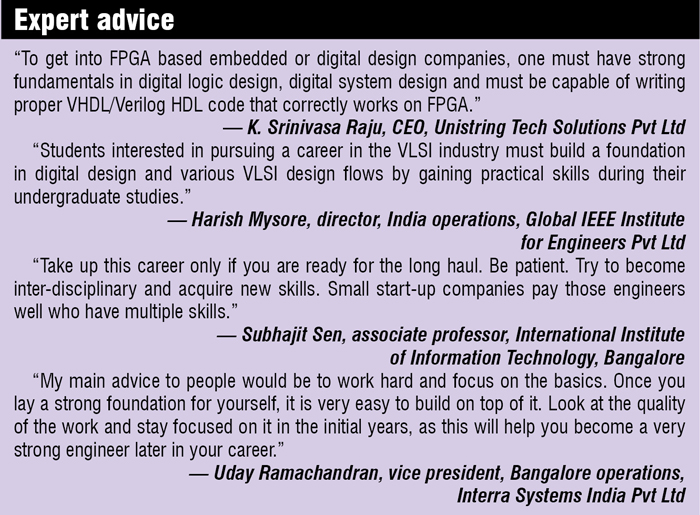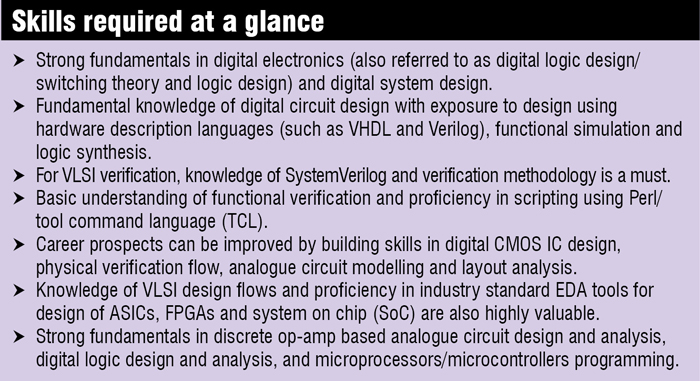When I was pursuing my engineering in electronics & communication several questions used to pop up in my mind. I used to wonder how will it be to work for a semiconductor company? Will I be working on CHIPS and not the “Potato” ones but the magical “Silicon” ones? How easy or hard will it be to get my first job in the VLSI industry? Will I ever be able to work in my dream semicon company? These questions were left unanswered until I stepped into the real world and found answers to most of them. However, my quest is still on and I have a long distance to cover. So, getting to the point straightaway – Why am I telling you all this? OK, the real reason behind telling you all this is because I have seen so many bright engineers straight out from the college who are passionate about getting into the VLSI industry but have no clue where to begin with? I want to help all the aspiring bright minds out there who want to start their career in the VLSI industry and most importantly are passionate about it. I know there are several questions which might be coming in your mind at this point of time and you might be hoping that all of your questions will be answered after reading this blog. Well to get the facts right that won’t happen and you may still have many questions unanswered. However, I can promise you at least one thing that after reading this blog you will get a sense of direction to achieve your goal. It’s up to you how much efforts you put in to reach your destiny but I can show you the path. So lets get started by answering the questions which bothered me the most when I was in college:
- Can I get into the VLSI industry as a fresher?
This is the most common and important question which comes into the minds of all the aspiring engineers out there who have a preconceived notion that VLSI industry is reluctant to hire freshers ! Well, the good news is that this is not true ! Of course you can get into this industry without any prior experience as a fresher. Most importantly, companies are willing to hire freshers if they have strong fundamentals as the cost to company for hiring a fresher is less compared to an experienced professional. Moreover, many companies are willing to train the freshers in order to meet their requirement. So, this is a myth that you cannot get a decent start in the VLSI industry as a fresher.
- What are the skills required to land a job in the VLSI domain as fresher?
Major VLSI companies look for strong fundamentals in the core engineering subjects. As many companies are in digital domain it makes more sense to get your fundamentals clear in subjects like digital electronics, microprocessors etc. This does not mean that you should totally ignore the basics of electronics for eg: Don’t be surprised if you are asked about “How a diode works?” or “Difference between various transistor types (BJT, JFET, MOSFET)?”. Actually it depends on what type of requirement is there in the company? Whether the company is looking for a candidate with strong digital concepts or somebody who is good in analog design and concepts. Therefore, it makes sense to study the job description very carefully before applying. This is the area where most of the freshers loose out. They are so desperate in landing in their first job that they hardly read the job description before applying. This can result in a two way loss both to you and the company. You may land up in a job which is not at all interesting for you. Sooner or later, you will loose focus or get bored. This will result in you leaving the organisation too early without learning much nor delivering much. It will be an even bigger loss to the company who hired you in the first place, loss of man hours of experienced professionals in interviewing you, training you and making you ready for the job. All major VLSI/EDA companies invest a lot in training the new hires as the work in these companies require special expertise in a specific domain. So, please for God’s sake and most importantly for your own benefit do read the job description carefully before applying and assess whether it has something to do with your area of interest.
- Is it mandatory for me to do a specialized course or training in VLSI ?
There is no YES/NO answer to this question. Doing a specialized training in VLSI and getting to know the demands of the industry obviously gives you an upper edge. Moreover, a training also prepares you for the kind of work you will be actually doing. However, finding a good training which meets the current demands of the industry is difficult. In addition to that there is a time and cost involved. Some may argue that on the job training is a much better alternative as you get an opportunity to work on cutting edge technologies with the cushion of a job at hand. That indeed is true. However, in case you are searching for a long time and not able to find one then it makes sense to go for some specialized training in VLSI. Premier institutes like CDAC impart training in VLSI which is well recognized and meets the current demand in the VLSI industry. Another alternative can be to go for an internship program in Semicon/EDA company. Many top Semicon/EDA companies offer extensive internship programs where you get a chance to work on cutting edge technologies. Candidates who perform well during their internship period are directly absorbed in the organization. Recently, this trend is becoming popular in the industry. It is a win-win situation for the candidate as they get direct exposure to the industry and a golden opportunity to be absorbed in the organisation itself. Another reason as to why students should take their internship seriously.
- What are the prospects of growth in the Semiconductor/EDA industry in India?
The Indian semiconductor industry offers high growth potential areas as the industries which source semiconductors as inputs are themselves witnessing high demand. The end-use industries such as mobile devices, telecommunication equipment, information technology, office automation (IT & OA), industrial machinery, automobiles and several other industries have applications for computing in some form or other and thereby necessarily have growing demand for semiconductors. Now with the concept of Internet of Things (IoT) picking up momentum, the next generation of interconnected devices would further increase the demand for intelligent computing, thereby creating sustainable demand for semiconductors.
India has a strong design base with more than 120 units. According to the Department of Electronics and Information Technology, nearly 2,000 chips are being designed every year in India and more than 20,000 engineers are working on various aspects of chip design and verification.Over the years, the Indian semiconductor design industry has developed significant capabilities and currently works on state-of-the-art products. Growing technical competence combined with stringent IP protection environment and trend towards localisation of contents will help this segment continue to grow.
There are more than 120 companies in India focused on semiconductor design for global products. This industry has witnessed a robust growth of 17.3 per cent since 2009 and today boasts of a 5.1 percent share of the global pie. Considering the continued growth momentum, the Indian semiconductor design market is expected touch US$ 14.5 billion in 2015.
So overall the furture looks quite bright for this industry and there seems to be no dearth of opportunities for you to grow.
- What kind of work is done in the Semiconductor/EDA industry in India?
To answer this question, I would rather not go by the book but tell you from what I have experienced till now. You can get an opportunity to work on any aspect of ASIC/FPGA design flow in India. In case you are in a startup you may be the one working on most of the things in the design flow. From creating High level design document to capturing low level details, from HW/SW partitioning to writing a C/C++ prototype, from implementation to verification, from RTL design to writing complex testbenches in HVLs, from RTL synthesis to Gate Level Simulation, from STA to Power Analysis you can get an opportunity to work in any of these challenging areas.
For those who are more interested in programming and do not want to dwelve into complexities of hardware design can explore areas like High Level Synthesis, HW/SW Co-simulation, Virtual Prototyping or Verification IP development. Most of the jobs in the VLSI industry in India are verification based, particularly for ASIC designs. Scope for a career in the design side of VLSI industry is currently somewhat limited as compared to other areas for three particular reasons. One, VLSI or chip design requires a deeper level of knowledge and skills than other electronics related fields. Two, VLSI chip design is expensive and requires access to high- cost, specialised electronic design automation (EDA) tools. Last, VLSI fabrication/prototyping is expensive and there is no commercial VLSI semiconductor manufacturing facility (foundry) in India.
Lastly, it is of utmost importance to be aware of the current trends in the industry. Visit websites of companies who are prominent players in Semicon/EDA space for eg: Synopsys (www.synopsys.com), Intel, Qualcomm, Freescale etc. Study about their product line, areas of expertise and the services they offer. You can also check out the attractive internship programs these companies offer. Bottomline is to stay up to date with the industry !
With this I would like to end this blog. I hope I am able to answer most of your queries on this very important but very less discussed subject. In case not, please feel free to drop me an email on chatwithviral84@gmail.com. I will try my best to answer your queries. Watch out this section for more interesting topics.
Please feel free to give your feedback and suggestions for improving my blogging skills since I am new in this area. Thanks a lot for taking time out for reading this blog.
Cheers …
Viral Sharma


